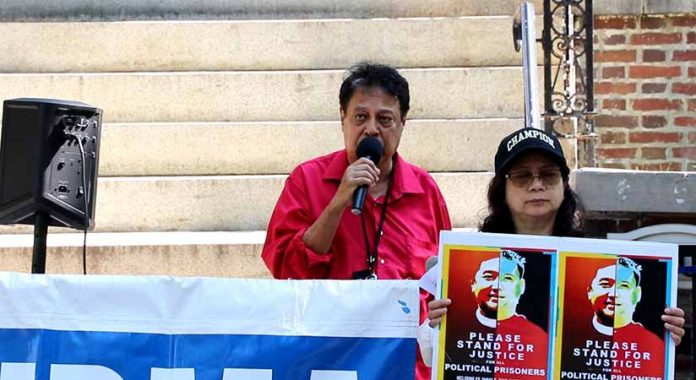Guest contributor
James Shwe
Since 1988, the Burmese diaspora in the U.S. has been actively advocating for democracy in Myanmar, driven by former student activists who faced imprisonment during the 1974-75 protests. Khin Maw, a former medical student imprisoned and expelled in 1974, remains a prominent leader in the Los Angeles area, exemplifying the enduring commitment made by Burmese in the U.S.
The 2021 military coup served as a catalyst for the diaspora’s mobilization, and they responded swiftly by staging impactful rallies across the U.S. These rallies helped raise awareness about the crisis and demanded the release of political prisoners. Their voices echoed in front of significant landmarks, including the City Halls of Los Angeles, San Francisco, Pasadena, and Stanton, the U.N. headquarters in New York City, and the State Department in our nation’s capital, Washington, DC.
We demonstrated solidarity through fundraising efforts, gathering individual donations and organizing food sales to support the Civil Disobedience Movement (CDM). As the National Unity Government (NUG) emerged in May 2021, the diaspora extended its financial support to this new entity as well as its People’s Defense Force (PDF) as soon as it was established by the NUG.
However, advocacy presented its challenges. Limited accessibility to congressional representative offices hindered direct engagement, prompting the diaspora to find alternative ways to convey their concerns and demands effectively. Moreover, the Myanmar crisis received limited media coverage, making it crucial for the diaspora to proactively spread awareness.
Misinformation campaigns by activists with ulterior motives clouded the narrative, necessitating a united front to ensure their authentic message was heard. On top of this, pro-military regime agents worked actively through third countries, seeking to discredit the diaspora’s cause and manipulate narratives. Additionally, lobbyists for the military regime in Naypyidaw posed obstacles, necessitating efforts to counter its influence.
Despite these obstacles, the diaspora persevered, recognizing their power as U.S. constituents. They organized petitions to condemn the coup and sanction Myanmar Oil and Gas Enterprise (MOGE), a vital revenue source for the military. Additionally, they engaged in discussions on legislation impacting Myanmar, seeking unity amidst differing perspectives.
Their collective efforts bore fruit when a group of native U.S. professional activists collaborated with Burmese members in creating the BURMA Act (Burma Unified through Rigorous Military Accountability). Introduced in October 2021 by Senator Ben Cardin and Representative Gregory Meeks, the bill received almost unconditional support from Burmese activists at the start.
However, as the bill was examined more closely, some Burmese voiced concerns about insufficient mention of the NUG, the lack of differentiation between civilian and military, unequal emphasis on various atrocities, and the need for reconciliation efforts. In response, a committee of thirteen diaspora activists, organized by Save Myanmar, prepared a petition for amendments and facilitated discussions to reach consensus.
By December 2021, the petition for amendments was submitted to select senators. The Burmese diaspora’s proactive efforts and collaboration with the original authors resulted in significant amendments to the bill, which was eventually approved by the House in April 2022. The BURMA Act was later inserted into the National Defense Authorization Act of 2023, which was signed into law last December.
At present, the diaspora continues to advocate for retaining appropriations for the BURMA Act, ensuring its impact on promoting democracy and human rights in Myanmar. Additionally, they strive to increase NUG involvement in the distribution of humanitarian aid, recognizing the significance of empowering legitimate leadership in effective aid allocation.
As they forge ahead, the Burmese diaspora in the U.S. place a growing emphasis on raising awareness of advocacy within their own community. They confront challenges such as limited accessibility, misinformation campaigns, and opposition from military regime agents and lobbyists, remaining resilient and unified in their commitment to supporting the people of Myanmar.
In summary, the journey of the Burmese diaspora represents an inspiring testament to their unwavering determination, strategic use of constituent power, and growing awareness of the importance of advocacy efforts. Their collective endeavor reflects a deep-rooted commitment to standing with the people of Myanmar, driving them towards a future marked by freedom, democracy, and inclusivity.
—
James Shwe is a Burmese-American living in the U.S. He has actively championed Burma’s democracy movement following the 2021 military coup. He advocates on behalf of both the U.S. government and Burma’s National Unity Government (NUG).
DVB publishes a diversity of opinions that does not reflect DVB editorial policy. We’d like to hear what you think about this or any of our stories: [email protected]



